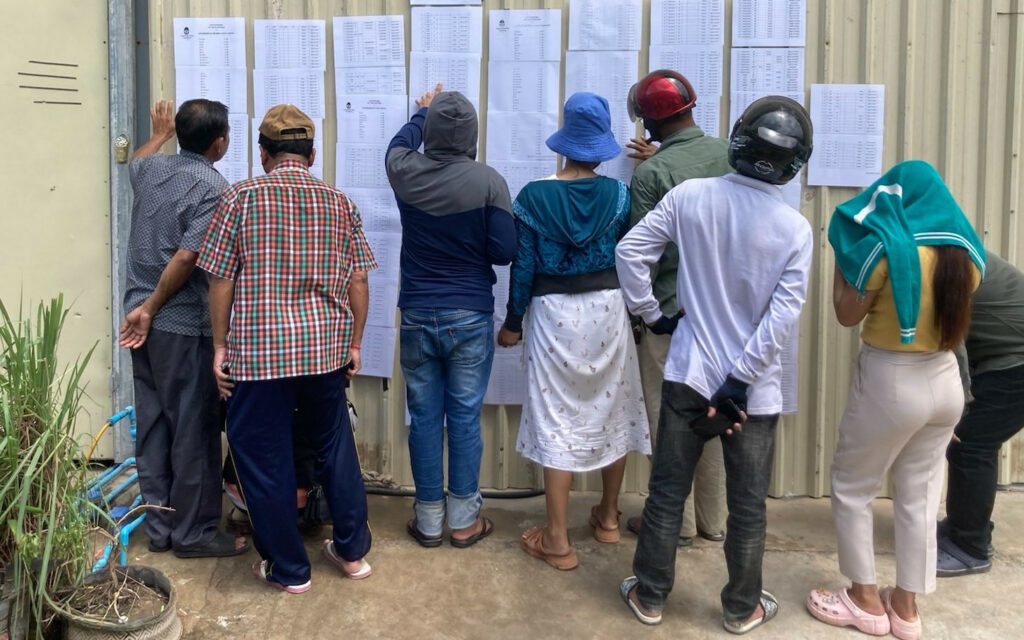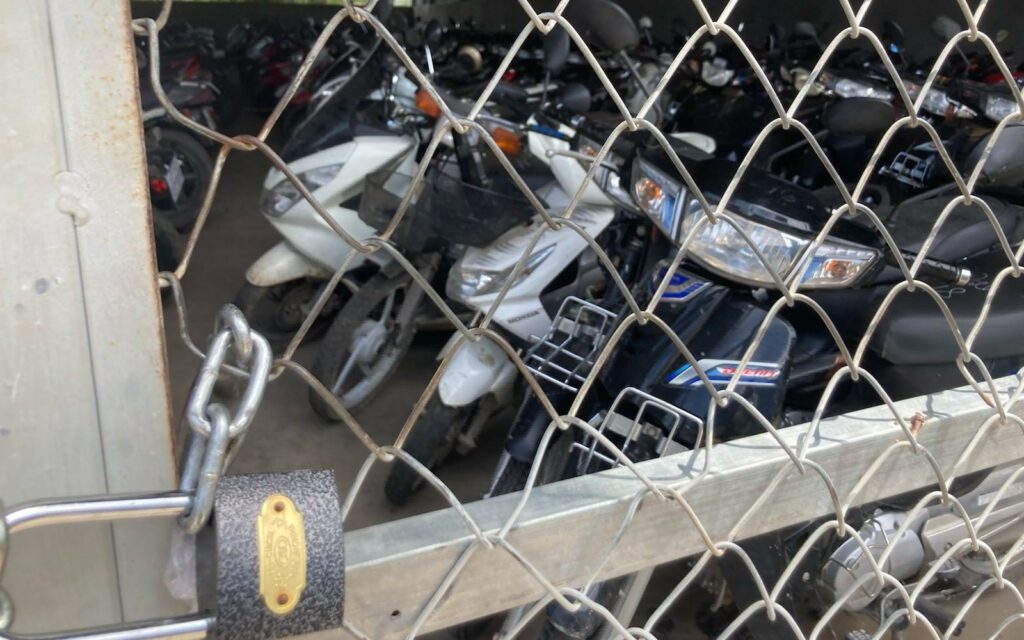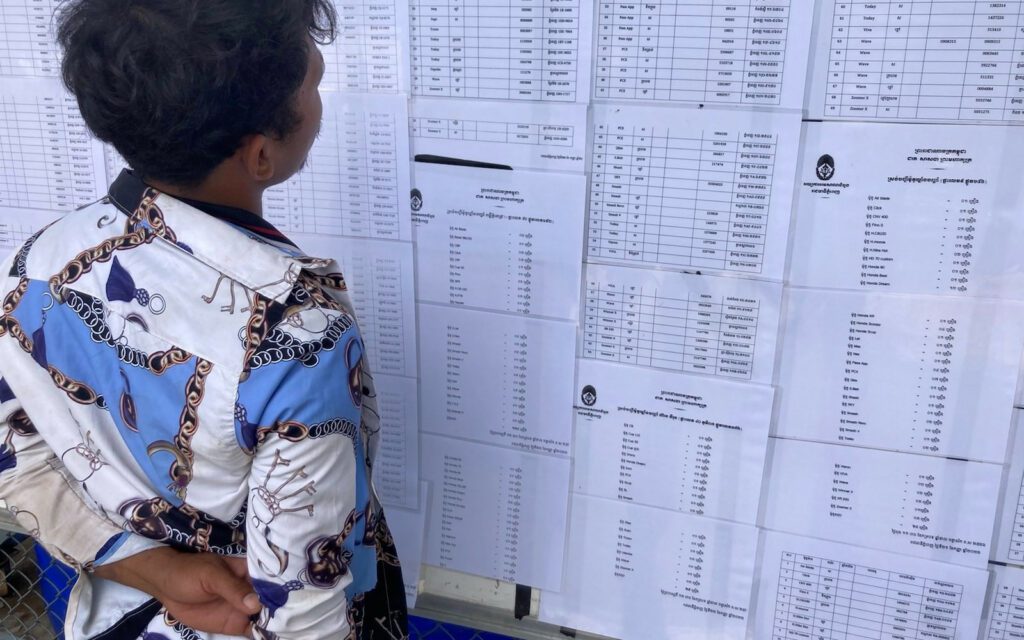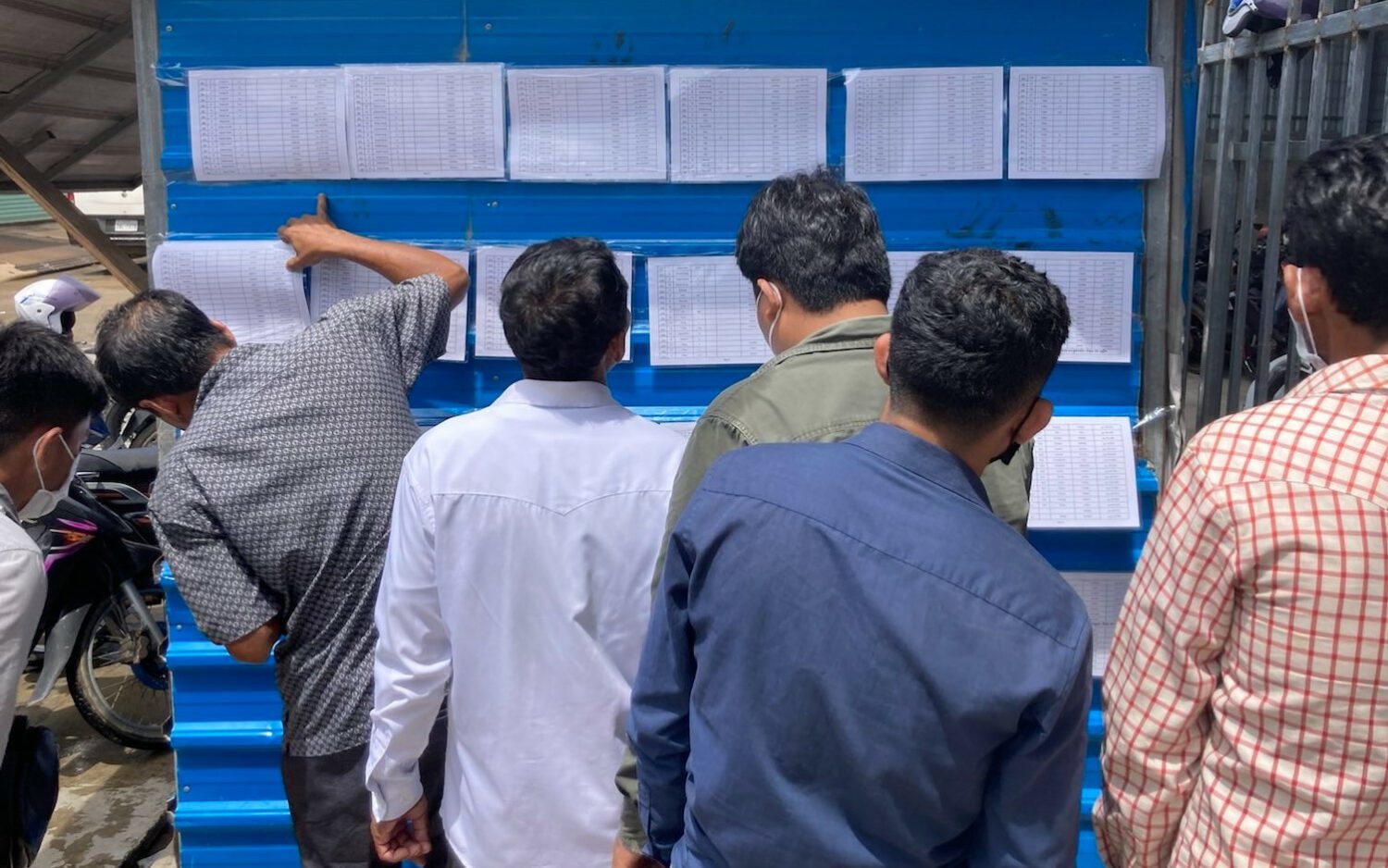Around 50 people stand near large corrugated metal garages packed with motorcycles. The people are packed close to each other and are trying to read large clusters of white papers, plastered onto the walls of the garages in Phnom Penh’s Chroy Changva district.
They are looking at lists of motorcycles that have been confiscated from illegal pawnshops across two locations in the city — a crackdown that took place just before the Pchum Ben holidays. The confiscated motorbikes have since been brought to the Chroy Changva warehouses.
A young man scans through a column of Honda Dreams, Zoomers and Super Cubs and said he had come from Prey Veng to check if his stolen motorcycle was on the list.
The confiscated vehicles fall into two categories: motorcycles pawned by the owner, or stolen two-wheelers pawned by thieves. In both cases, the pawning occurred at an unregistered pawnshop.
Another moto-seeker, Leng Chanthorn, finds his vehicle on the list. The two-wheeler was stolen around three months ago and, despite filing a police complaint, Chanthorn had lost hope of getting back his motorcycle. In that time, he found it hard to get to work and had to rely on others to give him a lift.
Now having shown district officials his ID card, motorcycle registration documents and police report, he was going to get his motorcycle back. But it was unclear when.
“They said they will collect maybe 10 motorcycles together and then return it to the owners together, but I do not know when,” he said.
Tum Samnang was getting ready to leave. She had already checked the lists for her brother’s motorcycle, which was pawned with one of the pawnshops. Samnang didn’t find her brother’s vehicle and was not sure which pawnshop he had used.
But as soon as she heard that owners of pawned motorcycles would have to repay the pawnshop owner, she lost interest.
“I found out that to get the motor back, I need to pay $880 including the interest. We do not have the money, therefore, we now do not want the motor back,” she said.
A Chroy Changva district official managing the return of motorcycles said that it wasn’t clear how they would deal with people who had pawned their vehicles, but it was likely that they would have to repay the pawnshop owner before getting their motorcycle back.



Phnom Penh deputy governor Khlaing Huot has led a crackdown against alleged illegal pawnshops. Local authorities had shut down 16 pawnshops, most in the Khlaing Romsey market in Tuol Kork’s Toek La’ak III commune.
Khliang Huot said the crackdown on illegal pawnshops, which happened on September 20 and 21 just before the Pchum Ben holidays, was essential because they were the main cause of criminal activity and illegal gambling. He said authorities were continuing to look for more illegal pawnshops in the market.
“With this, we also arrested 10 people, as three of them are the owners of illegal pawnshops and the others are those who are working in these places,” he said.
Huot said there were over 1,000 motorcycles confiscated from these pawnshops, some of which had been pawned without proper documents. Anyone who had lost their motorcycle could go and check the list of motorcycles, he said, and take back their vehicles if they located it.
“We will continue to find out about all the illegal pawnshops across Phnom Penh. We have neglected this issue. But now we found out and will address it accordingly,” he said.
Commune chief Chea Kheang said there were around 60 pawnshops in the market area and that most were legally operating, but 16 of them had been shut down.
“They have been doing their business for over a decade. The majority of them are doing it legally and some do not have proper legal procedures,” he said.
The commune hall is a stone’s throw away from a short street that ends in an intersection. There are at least 20 pawnshops on the street, all with green signage and names in English and Khmer.
Seven pawnshops on the street have their doors closed, the signage on some of these shops taken down. A single sheet of paper is taped to the front gates of these shops announcing their closure, signed by local police, district officials and Huot.
The street is quiet and residents and pawnshop owners are reluctant to speak. A pawnshop employee said they were not perturbed by the crackdown because they were legally registered. However, police officials were checking the area routinely to see if the shuttered shops had reopened.
At one end of the street, district security guard Yorn Mao is having a lunch of two soups and white rice. He said he was not part of the crackdown and had been instructed to sit at a warehouse filled with motorcycles that were yet to be moved to Chroy Changva.
Pawnshop owners and employees are reluctant to even acknowledge the raid and all answer, “I don’t know” to a range of questions. A group of pawnshop employees, sitting around a table drinking coffee, said the crackdown had kept their existing customers away from the street and new customers now assumed pawnshops in the area were unregistered.
Another man at a pawnshop said regulations allowed them to charge $30 interest for a $1,000 loan for a motorcycle. The rate is higher for cars. However, shops would charge more to make the loan more profitable.
A woman, who didn’t want her name or pawnshop to be identified for fear of retribution from local police, said pawnshops in the area mostly accepted motorcycles, but would occasionally get phones and gold.
“People have different financial problems: money to support their livelihood, to pay loans and rent,” she said.
She didn’t want to talk about the illegal pawnshops.
“If we say too much the police can crack down on us,” she said.













